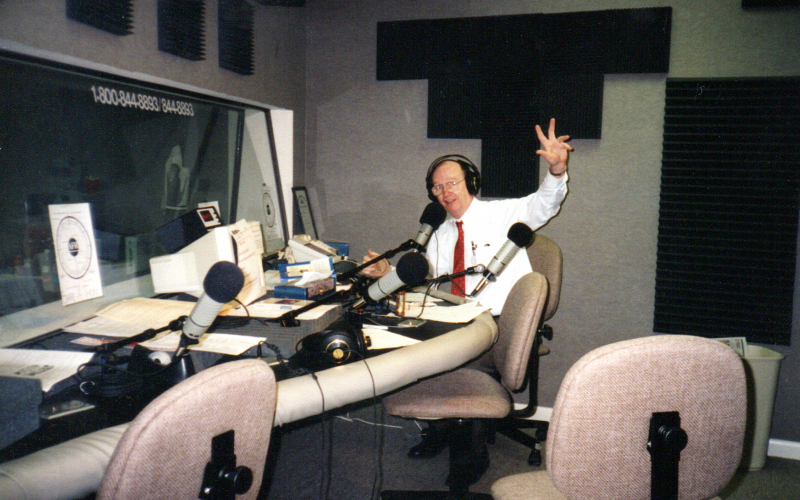Walking in the Word
Sign up for a six month free
trial of The Stand Magazine!
On Thursday evening, February 22, 2024, at 6:24 Eastern, America successfully landed a spacecraft on the moon for the first time in a little over 51 years. It hadn’t been done since the final Apollo moon mission in December 1972.
This lunar landing was a bit bumpy for Odysseus, the unmanned, robotic spacecraft privately owned by Intuitive Machines, an aerospace company started by a couple of NASA veterans and headquartered in Texas. The 14-foot-tall Odysseus came in too fast (at six mph) for its lunar landing and snapped a leg, ending up on its side with antennae askew. This awkward landing position subsequently disabled one of the craft’s solar panels, making communication with the team back in Houston a little more difficult than anticipated.
Despite these setbacks and other technical issues, Intuitive Machines has declared its mission a success and is excited to study all the data that Odysseus gathered. Plus, the company has gained lots of hands-on experience that will make future missions even more productive.
I would imagine so!
But I highly doubt that children across the nation will wait with bated breath for that next Odysseus mission. Sadly, most American kids are so well-versed with computers and other technology that they’ve lost the sense of wonder we all had during those first space missions.
I mean, think about it! Every person my age and older can recall exactly where they were the moment that Neil Armstrong and Buzz Aldrin landed their lunar module Eagle on the moon on July 20, 1969.
I was at an all-day family reunion in Houston, Mississippi, at Uncle J.D. Griffin’s house. My cousins and I watched and cheered when we heard, “The Eagle has landed.” One by one, we wandered back outside to play and wait for the real wonder of wonders.
Sure enough, hours later, our parents and grandparents made us come back inside to watch the first moonwalk. We sat in awe, staring at that old black-and-white television screen, as a real-live space-suited American astronaut, Neil Armstrong, put his foot down on the surface of the moon – the very same moon we had looked at every night of our lives.
Now, my Wilson family, with 14 siblings and their families, was the largest, loudest group of humans on earth. It’s usually hard to get a word in edgewise or ever be heard over the raucous talking and laughing.
But you could have heard a pin drop that hot and humid summer night long ago, as Armstrong’s voice resounded from the moon right down into that small-town Mississippi house, declaring, “That’s one small step for man, one giant leap for mankind.”
I will never forget that moment. It changed everything. Seriously! If our country could build spaceships, travel to outer space, and even walk on the moon, then anything seemed possible. My cousins and I laughed and wondered if Americans would even travel to Mars one day.
Then, we ran back outside with Mason jars – provided by our mommas in hopes of clearing out the crowded house – to see who could catch the most lightning bugs. (That’s what we call fireflies here in Mississippi.)
That historic moment happened almost 55 years ago, and I still marvel at the magnitude of that accomplishment. (And I also marvel that we often forget to mention astronaut Michael Collins, who stayed aboard Columbia to pilot the command and service module solo – until Armstrong and Aldrin returned and redocked for the trek home.)
When thinking about their historic voyage and other early lunar flights, keep in mind that Intuitive Machines had all of today’s computer technology available to help them guide a robotic spacecraft to the moon. But those mighty pioneers of the Apollo space program accomplished the same feat with a lot less technology. And in terms of lives lost, it was a very costly achievement.
In fact, one of NASA’s objectives for Apollo 11 directed Armstrong and Aldrin to leave commemorative medallions there on the moon’s surface. The medallions bore the names of the three Apollo 1 astronauts and two Russian cosmonauts, all of whom lost their lives in the world’s pursuit of reaching the moon.
That first tragedy aboard Apollo 1, in which astronauts Gus Grissom, Edward H. White II, and Roger B. Chaffee died in a launch pad fire, did not deter the American space program. It may have even pushed NASA harder to achieve its goal of reaching the moon.
I find it ironic that when Apollo 8 did succeed and astronauts Frank Borman, Jim Lovell, and Bill Anders became the very first humans to ever orbit the moon on Christmas Eve of 1968, they commemorated their achievement by sending a live two-minute message back home to earth.
In that historic Christmas Eve recording made during a lunar sunrise, the three astronauts took turns reading from Genesis 1:1-10, and they ended their message with, “And God bless all of you, all of you on the good earth.”
Sadly, those were different times, and that was a vastly different world from today. But no matter how many future lunar landings are made, or how many more men tread on the moon, or even if man one day does make it to Mars, the message of Apollo 8 will still stand true, “In the beginning God ….”
Yes, God is, was, and always will be. And therein lies the biggest problem with our world today: We have forgotten that He is God, and we are not. Regardless of how advanced our technology is, He is the Creator, and we are merely His creations. Everything we achieve is done (or undone) through His mercy and grace.
The early astronauts knew this. In fact, 29 of America’s earliest astronauts professed to be Christians. Twenty-three were Protestants, six were Catholics, and many of that number served as leaders back on Earth in their home churches.
Several of those early space pioneers spoke openly of how their missions impacted their faith and daily walk with Christ – including Buzz Aldrin.
Aldrin was an elder in his Presbyterian Church and was given permission by his pastor to carry bread and wine for a time of Communion on the moon. So before exiting the lunar module for his turn at moon walking, he read John 15:5, “I am the vine, you are the branches. Whoever remains in me, and I in him, will bear much fruit; for you can do nothing without me.”
Finally, here’s a thought as we contemplate this new voyage of Odysseus and those past Apollo space missions: Maybe we need to honor Aldrin’s words of scriptural wisdom more than we honor his monumental walk on the moon.
After all, the only hope America has at this point is remaining in Christ.

Sign up for a free six-month trial of
The Stand Magazine!
Sign up for free to receive notable blogs delivered to your email weekly.



















